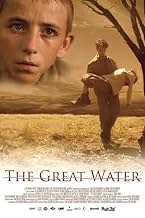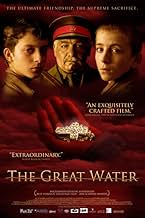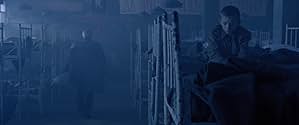IMDb-BEWERTUNG
7,0/10
900
IHRE BEWERTUNG
Füge eine Handlung in deiner Sprache hinzuBased on a children's book written by Zivko Cingo in the 1970s, the movie is about the difficult transition in Macedonia after World War II.Based on a children's book written by Zivko Cingo in the 1970s, the movie is about the difficult transition in Macedonia after World War II.Based on a children's book written by Zivko Cingo in the 1970s, the movie is about the difficult transition in Macedonia after World War II.
- Auszeichnungen
- 4 Gewinne & 1 Nominierung insgesamt
Krume Matov
- 2nd Bodyguard
- (as Krume Matev)
Empfohlene Bewertungen
10dragec
The Great Water represent an absolute summary of the emotional values that Macedonian literature has given us for centuries. An outstanding performance and adaptation of the novel, originally written for children. The structure of the film, unintentionally follows the smooth fabric of Zhivko Chingo's structural approach in writing, and that is something that really amazes me. This is an unbelievable rise of the Macedoian cultural sensibility in means of presenting the potential through a wider view, in a western way, but yet so familiar and authentic. I think that all movie lovers, esp. those enjoying the films of Steven Spielberg, David Lynch and Wim Wenders will love this film, since the film line has similarities to these authors, but, again it is totally authentic.
Much has gotten told of Europe during World War II, less about what happened right after the war was over. Macedonia (then part of Yugoslavia) saw the Nazis defeated but saw a new terror arise. Tito's government established orphanages for children of anyone considered an enemy of the new government. Ivo Trajkov's "Golemata voda" ("The Great Water" in English) looks at the hellish conditions in one such orphanage. It's based on a children's book by ivko Čingo, but this is no children's story in the general sense. The story gets told as a flashback, with the main character remembering the horror that he experienced in an orphanage and how he befriends a new boy in the orphanage.
It only adds to the tragedy that Yugoslavia's breakup caused a war, and then Macedonia's government participated in the extraordinary rendition program. But anyway, this is a really good, really intense movie. I watched it to see how much Macedonian sounds like Russian; there were a few words that I could understand but mostly it sounds different.
I recommend the movie.
It only adds to the tragedy that Yugoslavia's breakup caused a war, and then Macedonia's government participated in the extraordinary rendition program. But anyway, this is a really good, really intense movie. I watched it to see how much Macedonian sounds like Russian; there were a few words that I could understand but mostly it sounds different.
I recommend the movie.
In many corners of Europe, there are tragic stories of early childhood suffered by those who survived the educational atrocities. The novel upon which this film is based, was written by Zhivko Chingo. Entitled, " The Great Water " or " Golemata Voda " in Macdonian, it is the story of Old Lem (Meto Jovanovski) recalling his early youth. Reminiscing his childhood as a boy played by (Saso Kekenovski), he recalls the shocking and abysmal conditions of his socialist's party school where he suffered indoctrination decreed by the Stalinist propaganda. Director Ivo Trajkov, documents the children's gloomy, dreary atmosphere, amid the dark often torturous conditions of the Czeck government's state run orphanages. Deprived of faith, hope and spirit, Lem dreams of freedom are non-existence until he meets Isak Keyten (Maja Stankovska) who's very appearance promises friendship. Under the watchful eyes of the Warden (Mitko Apostolovski) and his aid Komrade Olivera (Verica Nedeska) life is grim at best. Still, Lem believes if he can win friendship in the eyes of Isak, then hope lies in his future. The dark, nearly impregnable prison presents itself as a bottomless pit where all dreams are forbidden. In this movie, the author's worse nightmares are the currency by which children exchange their obedience for a day's existence. ****
Zhivko Chingo wrote a children's book in the 1970s, a Yugoslavian best seller, 'Golemata voda' ('The Great Water') about the way the children of Macedonia responded to the critical changes Communism created in the country in 1945. It is stunningly brought to the screen by Ivo Trajkov as a labor of love and dedication and as an attempt to pay homage to the philosophical sensibilities of the Macedonian people in a difficult time of transition.
The film begins in the present as old Lem (Meto Jovanovski) is experiencing a heart attack and while he is being wheeled into a hospital and examined and wired, he has memory flashbacks to his childhood in 1945 when the WW II was over, Stalin was in power, and orphans were placed in 'orphanages' (re-education facilities) to learn the Communist life. Young Lem (Saso Kekenovski) was brought to the 'orphanage' when his parents were imprisoned for their anti-Stalin stance, and since he is new to the system, he must quickly adjust to the Dickens-like poor house conditions. He is befriended by his 'instructors' Ariton (Mitko Aposolovski) and Olivera (Verica Nedeska), learning how to adjust to the role of obedient brainwashing. The most influential person in Lem's life arrives in the form of young Isak (Maja Stankovska) whose girlfriend has been in the camp prior to Isak's arrival. The manner in which Lem struggles to repay Isak's kindnesses is by acting as a liaison with camp commander to find Isak's love. It is this friendship's course that serves as the tender core of this film.
The struggles quietly underplaying all of the camp surface activity are many: the dichotomy of a Communist ideology removing the Church from existence with a people dependent upon the spiritual values of religion, the Stalin/Tito issue, the adjustments to the policies of Communist regime in a country where fierce national pride had ruled, and the depersonalization of children into political pawns despite the need for role models and the luxury of growing up with friends and confidants. But it is the powerful effect of retrospect as the old Lem relives this tragic time that fills this film with luminous meaning.
This is one of the few films that has been made in Macedonia (a former portion of Yugoslavia now the Republic of Macedonia) and it is a genuinely touching, finely tuned work of art, one that depends on a large cast of non-professional child actors gathered from the Macedonian schools by Ivo Trajkov. The DVD is accompanied by a statement by Trajkov not only about the film but also about the pride of Macedonians that is enlightening and tender. Highly Recommended. Grady Harp
The film begins in the present as old Lem (Meto Jovanovski) is experiencing a heart attack and while he is being wheeled into a hospital and examined and wired, he has memory flashbacks to his childhood in 1945 when the WW II was over, Stalin was in power, and orphans were placed in 'orphanages' (re-education facilities) to learn the Communist life. Young Lem (Saso Kekenovski) was brought to the 'orphanage' when his parents were imprisoned for their anti-Stalin stance, and since he is new to the system, he must quickly adjust to the Dickens-like poor house conditions. He is befriended by his 'instructors' Ariton (Mitko Aposolovski) and Olivera (Verica Nedeska), learning how to adjust to the role of obedient brainwashing. The most influential person in Lem's life arrives in the form of young Isak (Maja Stankovska) whose girlfriend has been in the camp prior to Isak's arrival. The manner in which Lem struggles to repay Isak's kindnesses is by acting as a liaison with camp commander to find Isak's love. It is this friendship's course that serves as the tender core of this film.
The struggles quietly underplaying all of the camp surface activity are many: the dichotomy of a Communist ideology removing the Church from existence with a people dependent upon the spiritual values of religion, the Stalin/Tito issue, the adjustments to the policies of Communist regime in a country where fierce national pride had ruled, and the depersonalization of children into political pawns despite the need for role models and the luxury of growing up with friends and confidants. But it is the powerful effect of retrospect as the old Lem relives this tragic time that fills this film with luminous meaning.
This is one of the few films that has been made in Macedonia (a former portion of Yugoslavia now the Republic of Macedonia) and it is a genuinely touching, finely tuned work of art, one that depends on a large cast of non-professional child actors gathered from the Macedonian schools by Ivo Trajkov. The DVD is accompanied by a statement by Trajkov not only about the film but also about the pride of Macedonians that is enlightening and tender. Highly Recommended. Grady Harp
Not many movies are made about WW2 that revolve around Russia's point of view, although this movie doesn't really focus much on the war itsself than it does the casualties of war and collateral damage.
Lem is an orphan who is captured by soldiers and put into an orphanage where he and many other orphans are being brainwashed to follow Communism. Being the new kid in the orphanage, he's forced to learn all of the routines that all the other kids already know.
After being there for some time, a new kid arrives by the name of Isak Keyten.
Now all of a sudden Lem doesn't feel so alone and tries his best to befriend the older boy.
The only way he could eventually befriend the boy was to ask the Commander in charge of the orphanage what happened to Isak's girl friend, who had been in the orphanage prior to Isak's arrival.
This movie does a beautiful job of showing how innocence can be lost rather quickly when children are forced to grow up fast in a hostile environment.
Lem is an orphan who is captured by soldiers and put into an orphanage where he and many other orphans are being brainwashed to follow Communism. Being the new kid in the orphanage, he's forced to learn all of the routines that all the other kids already know.
After being there for some time, a new kid arrives by the name of Isak Keyten.
Now all of a sudden Lem doesn't feel so alone and tries his best to befriend the older boy.
The only way he could eventually befriend the boy was to ask the Commander in charge of the orphanage what happened to Isak's girl friend, who had been in the orphanage prior to Isak's arrival.
This movie does a beautiful job of showing how innocence can be lost rather quickly when children are forced to grow up fast in a hostile environment.
Wusstest du schon
- WissenswertesThree main locations: the courtyard, the factory and the lake are actually more than 100 miles from each other. Blending all three locations into one was done by very carefully selected camera angles and set pieces.
Top-Auswahl
Melde dich zum Bewerten an und greife auf die Watchlist für personalisierte Empfehlungen zu.
Details
- Erscheinungsdatum
- Herkunftsländer
- Offizielle Standorte
- Sprachen
- Auch bekannt als
- The Great Water
- Drehorte
- Produktionsfirmen
- Weitere beteiligte Unternehmen bei IMDbPro anzeigen
Box Office
- Bruttoertrag in den USA und Kanada
- 17.257 $
- Eröffnungswochenende in den USA und in Kanada
- 6.484 $
- 19. Juni 2005
- Weltweiter Bruttoertrag
- 17.257 $
- Laufzeit
- 1 Std. 33 Min.(93 min)
- Farbe
- Sound-Mix
- Seitenverhältnis
- 2.35 : 1
Zu dieser Seite beitragen
Bearbeitung vorschlagen oder fehlenden Inhalt hinzufügen





















